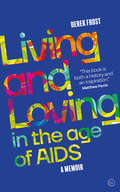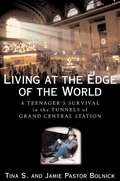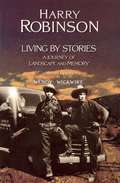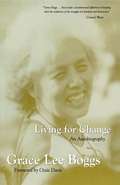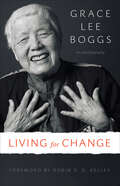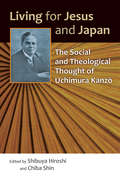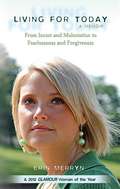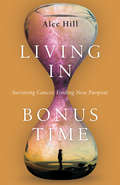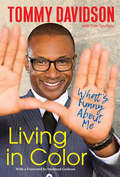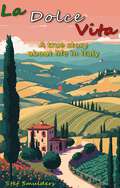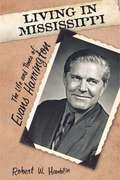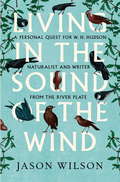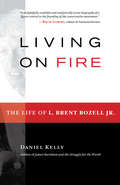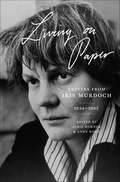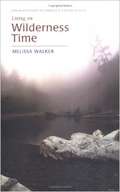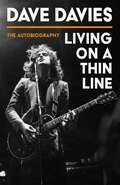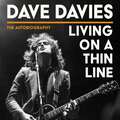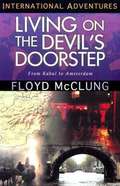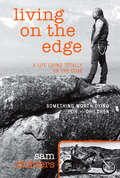- Table View
- List View
Living and Loving in the Age of AIDS: A memoir
by Derek FrostThis is the tale of a devastating pandemic, of lives cut painfully short; it's also a love letter.Derek, a distinguished designer and J, his husband, a pioneering entrepreneur and creator of both The Embassy Club, London&’s answer to Studio 54, and iconic Heaven, Europe&’s largest gay discotheque, met and fell in love more than 40 years ago. Their lives were high-octane, full of adventure, fun and fearless creativity. Suddenly their friends began to get sick and die – AIDS had arrived in their lives. When they got tested, J received what was then a death sentence: he was HIV Positive. While the onset of AIDS strengthened stigma and fear globally, they confronted their personal crisis with courage, humour and an indomitable resolve to survive. J&’s battle lasted six long years. Turning to spiritual reflection, yoga, nature – and always to love – Derek describes a transformation of the spirit, how compassion and empathy rose phoenix-like from the flames of sickness and death. Out of this transformation also came Aids Ark, the charity they founded, which helped to save, amongst the world&’s most marginalised people, more than 1,000 HIV Positive lives.This is a story of joy and triumph; about facing universal challenges; about the great rewards that come from giving back. Derek speaks for a generation who lived through a global health crisis that many in society refused even to acknowledge. His is a powerful story chronicling this extraordinary time.
Living at a Lighthouse: Oral Histories from the Great Lakes
by Luanne Gaykowski KozmaOral histories talking about the everyday life while living at a lighthouse.
Living at the Edge of the World
by Tina S. Jamie Pastor BolnickWhen Tina S. meets April, a teenage runaway, she thinks she's found her best friend. She leaves behind her dysfunctional family to join April in the tunnels of Grand Central Station amidst the homeless and drug addicted. Soon she's bingeing on crack--just like April--and stealing, scamming and panhandling to support her habit and to survive on the streets. In her own words, she describes her descent into crack addiction, being raped in the tunnels, her several arrests and jail terms and her grief and guilt over the death of April, whom she'd come to love. Finally faced with the reality that she might not make it through one more day, Tina takes her first difficult steps towards a normal life.With the help of a homeless advocate and his wife, a gay uncle dying of AIDS, and the woman who was to become her co-author on this book, Tina turns her life around and makes her way back to the world of the living.
Living by Stories
by Harry Robinson Wendy WickwireLiving by Stories includes a number of classic stories set in the "mythological age" about the trickster/transformer, Coyote, and his efforts to rid the world of bad people - spatla or "monsters," but this volume also presents historical narratives set in the more recent past, which involve the arrival of new quasi-monsters - "SHAmas" (Whites).
Living for Change
by Grace Lee BoggsLiving for Change is a sweeping account of the life of an untraditional radical from the end of the thirties, through the cold war, the civil rights era, and the rise of Black Power, the Nation of Islam, and the Black Panthers to the present efforts to rebuild our crumbling urban communities. This fascinating autobiography traces the story of a woman who transcended class and racial boundaries to pursue her passionate belief in a better society. Grace Lee Boggs was raised in New York City during a time when her father was not allowed to buy land for their home because he was Chinese. Educated at Barnard and Bryn Mawr, Boggs was in her twenties when radical politics beckoned, and she was inspired to become a revolutionary focusing on the black community.During her early years as an activist in New York, Boggs began a twenty-year friendship and collaboration with C. L. R. James, the brilliant and influential West Indian Marxist to whom she devotes a revelatory chapter of this book. In 1953, she moved to Detroit where, she writes, "radical history had been made and could be made again." It was also the home of James Boggs, an African American auto worker (and later author and revolutionary theoretician) who would become one of the movement's freshest and most persuasive voices, as well as Grace's husband. Beginning with their work together on the newsletter Correspondence, Grace and James formed the core of a network that over the years would include Malcolm X, Lyman Paine, Ping Ferry, Ossie Davis and Ruby Dee, Kwame Nkrumah, Stokely Carmichael, and inner-city youth.Rich in the personalities and anecdotes of twentieth-century progressive activism, Living for Change is an involving and inspiring look at a remarkable woman who continues to dedicate her life to social justice.
Living for Change: An Autobiography
by Grace Lee BoggsNo one can tell in advance what form a movement will take. Grace Lee Boggs&’s fascinating autobiography traces the story of a woman who transcended class and racial boundaries to pursue her passionate belief in a better society. Now with a new foreword by Robin D. G. Kelley, Living for Change is a sweeping account of a legendary human rights activist whose network included Malcolm X and C. L. R. James. From the end of the 1930s, through the Cold War, the Civil Rights era, and the rise of the Black Panthers to later efforts to rebuild crumbling urban communities, Living for Change is an exhilarating look at a remarkable woman who dedicated her life to social justice.
Living for Jesus and Japan: The Social and Theological Thought of Uchimura Kanzo
by Shibuya Hiroshi & Chiba ShinUchimura Kanzo (1861–1930) was an independent, original, and thought-provoking pioneer of Christianity in modern Japan. His theological values were organically linked with his aspiration for living and practicing such evangelical ideas as prophetic existence, neighborly love, social justice, pacifism, patriotism, and internationalism in the sphere of public life. Uchimura's commitment to the interaction between religious thought and social life is apparent in his well-known epitaph: "I for Japan; Japan for the World; the World for Christ; and All for God."In this interdisciplinary, multi-angled approach to Uchimura Kanzo, the contributors shed light on the inner logic, meanings, and modes of interaction between the religious and social thought observable in Kanzo.Contributors:Andrew E. BarshayKei ChibaShin ChibaKyougae LeeHiroshi MiuraTsunao OhyamaHiroshi ShibuyaTakashi ShogimenYasuhiro TakahashiKunichika Yagyu
Living for Today: From Incest and Molestation to Fearlessness and Forgiveness
by Erin MerrynSilence Broken and Stigmas Shattered -- Help for Incest Survivors Is HereFans of Erin Merryn's heart-wrenching debut memoir Stolen Innocence were left wondering at the end what would become of an emotionally fragile Erin after her confrontation with the reality of being a child of incest and molestation. In Living for Today, readers find that Erin cultivated the strength to face her abuser and eventually facilitated and experienced relief from years of emotional restlessness, while also igniting the beginnings of a new fearless journey. Living for Today chronicles that journey, which began with the unearthing of private shame and releasing of ugly memories and letting go of guilt and becoming the mouthpiece of millions of her generation. Through her compelling narrative, readers will learn how they, too, can: Learn to look forward, in spite of an abusive past Block off any impending guilt from outing an abuser Deal with interfamily strife as a result of incest and molestation Shake off the "victim" tag and replace it with one that reads "survivor" Living for Today is Merryn's contribution to an audience that has felt victimized, ashamed, isolated, and silenced by its abusers and offers a roadmap for self-discovery, forgiveness, and empowerment to help readers rid the stigma they have attached to their trauma and live fully and fearlessly for today.
Living in Bonus Time: Surviving Cancer, Finding New Purpose
by Alec HillCancer confronts us with our mortality. But cancer survivors find ourselves with a second chance for life.
Living in Color: Stories from In Living Color, Pop Culture, and the Stand-Up Comedy Scene of the 80s & 90s
by Tommy DavidsonIn 1990, Tommy Davidson burst onto the scene in the Emmy Award-winning show In Living Color, a pioneering sketch comedy show, featuring a multi-racial cast of actors and dancers who spoke to an underrepresented new generation created by Hip Hop Nation. A story of black excellence, in this revealing memoir, Tommy shares his unique perspective on making it in Hollywood, being an integral part of television history, on fame and family, and on living a life that has never been black and white—just funny and true . . . Abandoned as an infant on the streets of Greenville, Mississippi, and rescued by a loving white family, Tommy Davidson spent most of his childhood unaware that he was different from his brother and sister. All that changed as he came of age in a society of racial barriers—ones that he was soon to help break. On a fledgling network, Tommy joined the cast of In Living Color, alongside other relative newcomers including Jim Carrey, Rosie Perez, Jamie Foxx and Jennifer Lopez—all united by an ingenious throng of Wayans siblings (Keenen, Damon, Kim, Shawn, and Marlon), poised to break new ground. Now Tommy gives readers the never-before-told behind-the-scenes story of the first show born of the Hip Hop Nation: from its incredible rise, to his own creation of such unforgettable characters as Sweet Tooth Jones and dead-on impressions of Sammy Davis, Jr., Michael Jackson, M.C. Hammer and Sugar Ray Leonard, and appearing in such classic sketches as &“Homie The Clown,&” the &“Hey Mon, family,&” and the unforgettable &“Ugly Woman,&” through guest-star skirmishes (and black eyes) to backstage tensions and the eventual fall of this pop-culture touchstone. He reveals his own nascent career on the stand-up circuit with Adam Sandler, Jerry Seinfeld, Louie Anderson and performing with Eddie Murphy and Richard Pryor, as well as reflections on working with Spike Lee, Halle Berry, Sam Jackson, Chris Rock and Jada Pinkett Smith. And he also shares his very personal story of living with—and being inspired and empowered by—two distinct family histories. Told with humor and hard-won honesty by a singular voice whose family and friendships help him navigate a life of personal and professional highs and lows, Living in Color is a bracing, illuminating, and remarkable success story. An homage to the groundbreaking series In Living Color was featured in Bruno Mars&’s music video for his hit song Finesse, a remixed collaboration with Cardi B. It was a loving tribute that exemplified the sustained cultural impact of the show, and now 90s kids can dig into their nostalgia through this humorous memoir of one of its stars!
Living in Italy: The Real Deal - How to Survive the Good Life
by Emese Mayhew Stef Smulders"a comical, often downright hilarious account" Reader's Favorite Review ☀️☀️☀️☀️☀️ "Smulders' storytelling artistry is wildly entertaining" Blogcritics/Reader Views ☀️☀️☀️☀️☀️ "There is more of the flavor of Italy in this book than in ... Frances Mayes’ ‘Under the Tuscan Sun’" Amazon review by Grady Harp HALL OF FAME TOP 100 REVIEWER "now I can add Stef Smulders to the list of my favorite ex-pat authors" N.N. Light In 2008 Stef Smulders, his partner Nico and their dog Saar emigrated to Italy to start a new life and set up their B&B Villa I Due Padroni. They sold their home, left their friends and family behind and took a leap into the unknown. Now Stef shares his experiences in a collection of witty short stories. The book treats the trials and tribulations of an emigration: what it was like to buy and renovate a house, to import a car, to gain residency, and much more. The reader is introduced to a full range of Italian characters, from the trustworthy to the rogue, from the gentle to the shameless, flesh and blood Italians. Some are stereotype, others unexpectedly original. Yet they never fail to amuse and entertain. Goodreads 4.43 rating (21 ratings) Readers’ reviews: “I was hooked after the first couple of lines and couldn’t put the book down until the end.” “What a fantastic read!” “Hilarious!" "Addicting!" "Recommended!"
Living in Mississippi: The Life and Times of Evans Harrington
by Robert W. HamblinRobert W. Hamblin elevates Evans Harrington (1925-1997), as well as his remarkable achievements and writings, introducing his legacy to a new generation. Harrington continually found himself in conflict with the conservative, and often reactionary, institutions of his society--be they educational, political, or religious. Yet unlike many Mississippi liberals and moderates of his day--white as well as black--Harrington did not leave the state for a freer environment or better opportunities elsewhere. Except for his military service, he stayed in Mississippi his entire life, and his presence made a difference.In 1962, Harrington openly supported the enrollment of James Meredith, the first African American student to attend Ole Miss. In 1965, he invited African American students from Tougaloo College to attend the Southern Literary Festival hosted by Ole Miss--the first meeting of that organization to be integrated. In 1972, as faculty sponsor of Images, the Ole Miss literary journal, he joined his student writers in a successful suit against the university's attempt to suppress an issue of the magazine that contained controversial content. In 1996, Harrington united with other ACLU members to support the cause of Lisa Herdahl, who had brought suit against the North Pontotoc, Mississippi, School Board for allowing sectarian prayers and devotionals in public school classrooms. Hamblin presents these and other examples, showing Harrington both as an exception to and as a representative figure of his time and place.This biography also explores Harrington and his writings, which include "Living in Mississippi," a personal essay about being a white liberal in segregated Mississippi; several short stories; a novel, The Prisoners; and three popular novels issued under the pseudonym Gilbert Terrell: Willa, Missy, and Lily, as well as a number of unpublished manuscripts. Harrington also coedited, with Ann J. Abadie, four volumes of papers presented at the annual Faulkner and Yoknapatawpha Conference, which he cofounded.
Living in Two Worlds: On Being a Social Chameleon with Asperger’s
by Dylan EmmonsDylan Emmons has always lived his life in two worlds. Diagnosed with Asperger's at the age of six, his school days were spent struggling to overcome the sensory and social hurdles that made fitting in with his classmates in the 'real world' so hard. An aspiring social chameleon, he attempted to blend in, despite his hidden other world of Asperger's. This book tells the story of his attempt, with the hindsight gained in adult life that it is better to spend energy learning to be happy, than learning to be 'normal'. By describing the two conflicting worlds of his childhood, Dylan Emmons reveals the reasons behind the actions, mood swings and awkwardness of children on the autism spectrum that can often appear mysterious and unprovoked to neurotypical family members, friends, teachers and professionals.
Living in the Sound of the Wind: A Personal Quest for W.H. Hudson, Naturalist and Writer from the River Plate
by Jason WilsonW. H. Hudson was brought up on the pampas, where he learnt from gauchos about frontier life. After moving to London in 1874, Hudson lived in extreme poverty. Like his friend Joseph Conrad, Hudson was an exile, adapting to England. He never returned to Argentina.Wilson unravels Hudson’s English dream, his natural history rambles, and his work to protect birds. He remains both a complex witness to his homeland before mass immigration and to his England of the mind, before the urban sprawl.Praise for Jason Wilson: Tireless, shrewd, erudite Jason Wilson, mixing hard fact and anthology, provides the perfect outfit of allusion and comparative experience - Jonathan Keates, ObserverPut his treasure trove into your pocket. - Anthony Sattin, Sunday TimesThe idea is so simple that it must be original. This inaugural book might prove to be a landmark. - Nicholas Shakespeare, Daily Telegraph
Living in the State of Stuck: How Assistive Technology Impacts the Lives of People With Disabilities
by Marcia SchererThe author interviews several people with severe disabilities over a period of years. She traces the effect technology has on their lives from their perspectives. Covers technology and many related social, economic and cultural issues. Firsthand real world experiences make this a valuable book.
Living it Arg
by James ArgentOne of the original cast members of the award-winning reality TV series, The Only Way is Essex, Arg is best known for his long-term relationship with Lydia Bright and his affectionate 'Bro-mance' with Mark Wright. A key figure in the show, he remains a favourite with writers and is a character loved by male and female fans alike. But life for Arg hasn't always been easy - broken hearts, an on-going battle with weight and self-esteem issues - there is a lot more to Arg than meets the eye and he lifts the lid here for the first time. From his disastrous on-going quest to find 'The One' to his secret passion for The Rat Pack and Frank Sinatra, Arg is an old-fashioned soul who found over-night fame and he tells us what really goes on behind the scenes of one of ITV's biggest hit shows.
Living on Fire: The Life of L. Brent Bozell Jr.
by Daniel Kelly&“A triumph . . . A moving, beautifully written biography.&” —National ReviewFrom the beginning, L. Brent Bozell seemed destined for great things. An extraordinary orator, the young man with fiery red hair won a national debate competition in high school and later was elected president of Yale&’s storied Political Union, where his debating partner was his close friend William F. Buckley Jr. In less than a decade after graduating from Yale, Bozell helped Buckley launch National Review, became a popular columnist and speaker, and, most famously, wrote Barry Goldwater&’s landmark book The Conscience of a Conservative. But after setting his sights on high political office, Bozell took a different route in the 1960s. He abruptly moved his family to Spain; he founded a traditional Catholic magazine, Triumph, that quickly turned radical; he repudiated on religious grounds the U.S. Constitution; he made it his mission to transform America into a Catholic nation; he led the nation&’s first major antiabortion protest (featuring a militant group known as the Sons of Thunder); he severed ties with his erstwhile friends from the conservative movement, including Buckley (who was also his brother-in-law). By the mid-1970s, Bozell had fallen prey to bipolar disorder and alcoholism, leading life as if &“manacled to a roller coaster.&” Biographer Daniel Kelly tells Bozell&’s remarkable story vividly and with sensitivity in Living on Fire. To write this book, Kelly interviewed dozens of friends and family members and gained unprecedented access to Bozell&’s private correspondence. The result is a richly textured portrait of a gifted, complex man—his triumphs as well as his struggles.
Living on Paper: Letters from Iris Murdoch, 1934–1995
by Iris MurdochFor the first time, novelist Iris Murdoch's life in her own words, from girlhood to her last yearsIris Murdoch was an acclaimed novelist and groundbreaking philosopher whose life reflected her unconventional beliefs and values. But what has been missing from biographical accounts has been Murdoch's own voice—her life in her own words. Living on Paper—the first major collection of Murdoch's most compelling and interesting personal letters—gives, for the first time, a rounded self-portrait of one of the twentieth century's greatest writers and thinkers. With more than 760 letters, fewer than forty of which have been published before, the book provides a unique chronicle of Murdoch's life from her days as a schoolgirl to her last years. The result is the most important book about Murdoch in more than a decade.The letters show a great mind at work—struggling with philosophical problems, trying to bring a difficult novel together, exploring spirituality, and responding pointedly to world events. They also reveal her personal life, the subject of much speculation, in all its complexity, especially in letters to lovers or close friends, such as the writers Brigid Brophy, Elias Canetti, and Raymond Queneau, philosophers Michael Oakeshott and Philippa Foot, and mathematician Georg Kreisel. We witness Murdoch's emotional hunger, her tendency to live on the edge of what was socially acceptable, and her irreverence and sharp sense of humor. We also learn how her private life fed into the plots and characters of her novels, despite her claims that they were not drawn from reality.Direct and intimate, these letters bring us closer than ever before to Iris Murdoch as a person, making for an extraordinary reading experience.
Living on Wilderness Time
by Melissa WalkerMelissa Walker set out on a journey that many women of her generation have mapped only in their dreams. Like many American chroniclers before her who have surrendered to the aimless pleasures of the road, Walker had no geographical destination in mind, but she did have two definite goals--one personal, one political--for her journey. She was looking for the peace and solitude of the backcountry, certainly, but she also wanted to learn the dynamics of preserving wild places and to devote herself to that cause. In the Sky Islands of southern Arizona, on the banks of the Popo Agie River and the Wind River Mountains in Wyoming, in Yellowstone, Grand Teton, Rocky Mountain, and Olympic National Park, in Gila and Glacier Peak Wilderness, she encountered the hazards of wild animals and extreme weather, and she began to reassess what parts of her life she could control. Living on Wilderness Time is a book for those who have visited wild places and want to return, and for others whose overcommitted urban lives make them long for land where time is measured differently and human beings are scarce. Above all it is a call to join those who, like Aldo Leopold, see wilderness as vital to the human community.Melissa Walker is vice president of National Wilderness Watch, chair of the Georgia chapter of Wilderness Watch, serves on the Southern Appalachian Council of the Wilderness Society, and is the author of Reading the Environment and Down from the Mountaintop. She has been Professor of English at the University of New Orleans and Mercer University and a fellow of Women's Studies at Emory University. Walker lives with her husband in Atlanta, Georgia.
Living on a Space Shuttle (Rookie Read-About® Science)
by Carmen BredesonThe toilet is like a vacuum cleaner. Being on the ceiling feels the same as being on the floor. Everything floats!
Living on a Thin Line
by Dave DaviesThe all new, must-read memoir by legendary Kinks guitarist Dave Davies'BOOK OF THE DAY' - Guardian'This powerful tell-all from the Kinks guitarist puts the spotlight on his own bad behaviour, dalliances with the occult and his recovery from a stroke.' - Observer'Heartfelt, hilarious, revealing, insightful and astonishingly candid. Boy, you really got me Dave. I can't wait to read it again.' - Mark Hamill Dave Davies is the co-founder and lead guitarist of epoch-defining band the Kinks, a group with fifty million record sales to their name. In his autobiography, Davies revisits the glory days of the band that spawned so much extraordinary music, and which had such a profound influence on bands from The Clash and Van Halen to Oasis and Blur. Full of tales of the tumultuous times and the ups-and-downs of his relationship with his brother Ray, along with encounters with the likes of John Lennon and Jimi Hendrix, this will be a glorious read for Kinks fans and anyone who wants to read about the heyday of rock 'n' roll.
Living on a Thin Line
by Dave DaviesThe all new, must-read memoir by legendary Kinks guitarist Dave Davies'BOOK OF THE DAY' - Guardian'This powerful tell-all from the Kinks guitarist puts the spotlight on his own bad behaviour, dalliances with the occult and his recovery from a stroke.' - Observer'Heartfelt, hilarious, revealing, insightful and astonishingly candid. Boy, you really got me Dave. I can't wait to read it again.' - Mark Hamill Dave Davies is the co-founder and lead guitarist of epoch-defining band the Kinks, a group with fifty million record sales to their name. In his autobiography, Davies revisits the glory days of the band that spawned so much extraordinary music, and which had such a profound influence on bands from The Clash and Van Halen to Oasis and Blur. Full of tales of the tumultuous times and the ups-and-downs of his relationship with his brother Ray, along with encounters with the likes of John Lennon and Jimi Hendrix, this will be a glorious read for Kinks fans and anyone who wants to read about the heyday of rock 'n' roll.
Living on a Thin Line
by Dave DaviesThe all new, must-read memoir by legendary Kinks guitarist Dave DaviesDave Davies is the co-founder and lead guitarist of epoch-defining band the Kinks, a group with fifty million record sales to their name. In his autobiography, Davies revisits the glory days of the band that spawned so much extraordinary music, and which had such a profound influence on bands from The Clash and Van Halen to Oasis and Blur. Full of tales of the tumultuous times and the ups-and-downs of his relationship with his brother Ray, along with encounters with the likes of John Lennon and Jimi Hendrix, this will be a glorious listen for Kinks fans and anyone who wants to hear about the heyday of rock 'n' roll.(P) 2022 Headline Publishing Group Ltd
Living on the Devil's Doorstep: From Kabul to Amsterdam
by Floyd McclungWhen thousands of young people checked out of Western society and sought enlightenment in the East, Floyd and Sally McClung set aside the comforts of American suburbia and answered God's call to reach out to them with the gospel. In Kabul, Afghanistan, a key stop on the hippy trail, and later in Amsterdam, Holland, the West's own window to that trail, the McClungs committed themselves to meeting the penniless, the drugged, the sick, and the disillusioned right where they were. Whether among hippy seekers or the addicts and prostitutes of Amsterdam's infamous Red Light District, the McClungs lived out a message of hope. Living on the Devil's Doorstep is a dramatic example of the difference one family can make when they are willing to trust GOd and walk in obedience to His call for their lives. On every continent, in every nation, God is at work in and through the lives of believers. From the streets of Manila to mysterious Albania to the jungles of Ecuador and beyond. This and every title in the International Adventures series emerges as a dramatic episode that could be directed only by the hand of God. There are 14 books in this International Adventures series.
Living on the Edge
by Sam Childers"Living on the EDGE" is the saga of a man who redirected his energy and bravery from drug dealing and debauchery to serving God. A compelling, first person account by Sam Childers, AKA "The Machine Gun Preacher." Detailing His battle to HELP the orphan children of Eastern Africa. The book is a follow up to Sam's BEST SELLER - Another Mans War, which was made into a Hollywood movie, Machine Gun Preacher, starring Gerard Butler as Sam!
